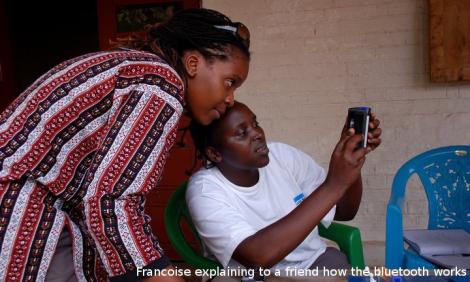Publication
16x16: Malaysia
In 16 slides x 16 seconds, Take Back The Tech! presentation narrates the story of how violence against women and ICTs links together in Malaysia. The presentation builds on the paper Malaysia: Violence against Women and Information Communication that , provides a snapshot and baseline on the law and policy in these two areas. The paper is part of the APC WNSP project 'MDG3: Take Back the Tech…
Publication
Democratic Republic of Congo (DRC): Violence against women and ICT
In the context of a country with one of the world's worst human rights records, women and girls are the victims of sexual violence perpetrated mostly by combatants from both sides. However, Sylvie Niombo finds in this paper that the intersections between violence against women and girls and ICTs in the DRC are not well established. The internet makes it possible to share experiences and receive…
Publication
Philippines: Violence against women and ICT
Jessica Umanos Sotos explores why specific law is needed in the Philippines to prosecute perpetrators of violence against women through the use of ICTs or cyberspace. She argues that national ICT institutions and private companies’ policies cannot remain blind to the violations to women’s rights perpetuated via ICTs in the context of the violation of privacy rights through the illicit production…
Publication
16x16: rights . violence . technology - joining the dots
Take Back The Tech! presentation narrating the story of how violence against women and ICTs links together in 16 slides x 16 seconds.
In depth
Argentina: Strategic use of ICT as a response to violence against women
Although violence against women through information and communication technologies is not yet a matter of public discussion in Argentina, the problem affects the lives of women and girls. A workshop held in Buenos Aires by APC WNSP to guide women in the strategic use of ICTs to combat violence resulted in some interesting initiatives. Concern regarding the irregular use made of cell phones, the…

In depth
Democratic Republic of the Congo: Two sides of the same ICT coin - breaking the silence /breaking the laws
GenderIT.org writer Mavic Cabrera-Balleza speaks with Sylvie Niombo and Francoise Mukuku, ICT activists from Congo-Brazzaville and the Democratic Republic of Congo (DRC) respectively. They discuss various facets of the information and communication technologies and the context to which they apply in the DRC . The interviewees elaborate on how ICTs can be used to reduce incidence of violence…

Editorial
Thoughts Around... Claiming communication rights
“Don't upload your photographs or videos on the pages of social networks, like Facebook or MySpace, nor personal information like email account or telephone numbers.” IT techies advise. “I have changed my gender from female to male on skype to avoid some annoying and harassing calls and chats sometimes even popping up in the middle of night or while I am working online.” a young woman shared. “Do…
Publication
Women and cybercrime in Kenya: the dark side of ICTS (Working document)
This study was commissioned by KICTANET as part of the GRACE Project, and supported by the International Development and Research Center (IDRC). It documents cybercrime against women in Kenya and by extrapolation the East African Community Member states. For example the study examines the type and quantity of prevalent cybercrime against women or how does cyber crime affect women differently. The…
Publication
Trafficking in human beings: Internet recruitment
This study is one of the outputs of the project on the Misuse of the Internet for the recruitment of victims of trafficking in human beings launched by the Council of Europe, and funded by the Government of Monaco. The study documents the various ways in which victims are recruited via the internet, and anticipate possible future techniques. It also highlights some of the best practices used to…
In depth
South Africa: Privacy and domestic violence online and off
While women's rights activists have been at the forefront of making the private crimes that occur at home - domestic violence, marital rape - public, new technologies are making the private public in ways that disenfranchise, alienate and violate women. Esther Nasikye and Sally-Jean Shackleton explore how ICTs, privacy and domestic violence in South Africa are showing up problems in both policy…




